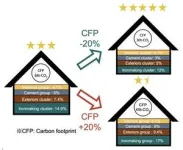The Davos Alzheimer’s Collaborative (DAC), the organization leading an unprecedented global response to Alzheimer’s, today announced the first-ever brain health and dementia conference in Africa, held in Nairobi, Kenya from September 11-12 in partnership with Nature Conferences and the Aga Khan University’s Brain & Mind Institute. The conference, “The Future of Dementia in Africa: Advancing Global Partnerships,” focuses on scientific advancements in understanding the impact of dementia, risk factors (e.g. genetics), and early detection methods, both in Africa and worldwide. This is a significant step in advancing brain health innovation, dementia care and research efforts across Africa and globally.
The conference will be attended by interdisciplinary experts and dementia stakeholders based in Africa and internationally, including researchers, industry leaders, local governments, policymakers, funders, and individuals with lived experience. The agenda will cover a broad range of issues, from current treatments, community-based healthcare initiatives, to emerging clinical trials. Building on scientific discourse, sessions will also be geared towards engaging policymakers, funders, and industry leaders to implement research innovations across international health systems and identify collaborative funding opportunities.
Africa’s growing healthcare landscape, characterized by rapid growth, urbanization, and a vibrant youth population, presents a unique opportunity for innovation in dementia and brain health. With an emphasis on grassroots initiatives, global partnerships, and leveraging advancing technologies, the continent stands poised to lead the charge in addressing diverse healthcare challenges. With the older African population set to triple by 2050, it's crucial to address the gaps in dementia and overall brain health research now.
“This first-of-its-kind conference on brain health in Africa focuses on the importance of brain health throughout the lifespan. From the brain skills required by younger generations for 21st century innovation, to the brain health risks from the escalating chronic health conditions in mid-life, to the emerging brain disorders of elders at risk for dementia, Africa’s unique demography is a rich source of brain health learnings for the rest of the world,” said George Vradenburg, Founding Chairman of the Davos Alzheimer’s Collaborative. “The African opportunity aligns with DAC’s commitment to link and scale brain health innovation from the world’s diverse racial and ethnic tapestry and across all resource settings to build the global brain resilience needed to address the massive 21st challenge of brain disorders.”
“Our conference will highlight the great strides we’ve made to address the gap in brain health research among indigenous Africans, despite Africa's rich genetic diversity. We'll delve into emerging research exploring how increasing African representation in research could unlock new insights and strategies for preventing and effectively treating dementia." said Zul Merali, Director, Brain and Mind Institute at the Aga Khan University.
The conference builds on DAC’s intervention-focused position targeting lifestyle factors that can reduce the risk of dementia and Alzheimer’s. At the conference, DAC will hold a roundtable geared towards allocating funding for brain health at the community and primary care physician level.
This conference will intentionally prioritize learnings from the global south with an emphasis on community health. The discourse offers a platform for leaders to share successes, understand shared challenges, and foster new collaborations that will drive future dementia research and care in Africa. The event is designed to facilitate a stronger network of dementia researchers and create a collaborative environment that can catalyze progress against dementia and Alzheimer’s and positively impact brain health. Learn more about the event here.
About the Davos Alzheimer’s Collaborative
Launched at the World Economic Forum’s 2021 meeting on The Davos Agenda, The Davos Alzheimer’s Collaborative is a multi-stakeholder partnership committed to aligning stakeholders with a new vision for our collective global response against the challenges Alzheimer’s presents to patients, caregivers, and healthcare infrastructures. Convened by The World Economic Forum and The Global CEO Initiative on Alzheimer’s Disease (CEOi) and fueled by a mission of service to the estimated 150 million families and half a billion people inevitably impacted by this disease by 2050, DAC is a collaborative for the benefit of all people, in all places.
About the Aga Khan University’s Brain & Mind Institute
The Brain and Mind Institute (BMI) at the Aga Khan University, operates in East Africa and Central/South Asia. BMI’s ethos is to span from neuron to the neighborhood, and across multi-country campuses. The operational model is to empower and strengthen neuroscience and mental health research and interventions through capacity building and partnerships; connecting the rich tapestry of academics, research entities, stakeholders, and communities of lived experience.
BMI facilitates interdisciplinary research, education and innovation in mental health and neurosciences. Through transdisciplinary research approaches, BMI aims to impact the lives of people who are affected by debilitating neurological and mental health problems. Whether it is uncovering the causes of illness or advancing breakthrough research into treatments or interventions, BMI’s approach is always mindful of the local needs of the people and communities at risk.
Nature Conferences
Nature Conferences are events tailored to the international scientific community to foster communication and collaboration between scientists at various research levels. Held in face-to-face and virtual formats, a multi-disciplinary schedule of events is launched each year in partnership with leading industry and institutional organizations in the scientific field globally. As part of the world-renowned Nature Portfolio of journals, editors carefully curate event programs to create immersive experiences that blend cutting-edge research with insightful discussions.
The Nature Portfolio of journals is home to Nature—the leading international weekly journal of science first published in 1869— and to selective subject-specific journals including Nature Medicine, Nature Aging, Nature Communications and Communications Medicine. Together, these journals publish some of the world's most significant scientific discoveries. Nature Portfolio, its journals, and Nature Conferences are all part of Springer Nature.
Learn more about Nature Conferences here and follow @Natureconf.
END



